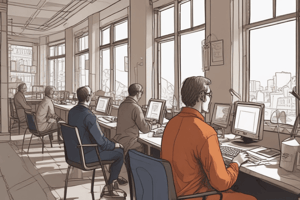Podcast
Questions and Answers
What is one major ethical concern associated with covert participant observation regarding consent?
What is one major ethical concern associated with covert participant observation regarding consent?
The lack of informed consent from participants.
How does deception play a role in ethical issues related to covert participant observation?
How does deception play a role in ethical issues related to covert participant observation?
Researchers mislead participants by hiding their true identity and research purpose.
In what specific way does covert participant observation potentially compromise the privacy of research subjects?
In what specific way does covert participant observation potentially compromise the privacy of research subjects?
By observing individuals in settings where they expect privacy without their consent.
What kind of legal risks might a researcher face when conducting covert participant observation, especially in studies involving deviant behavior?
What kind of legal risks might a researcher face when conducting covert participant observation, especially in studies involving deviant behavior?
Describe the argument that some sociologists make to justify covert participant observation despite its ethical issues.
Describe the argument that some sociologists make to justify covert participant observation despite its ethical issues.
How might the Hawthorne effect relate to the use of covert participant observation?
How might the Hawthorne effect relate to the use of covert participant observation?
How would a functionalist or utilitarian ethical perspective evaluate the use of deception in covert participant observation?
How would a functionalist or utilitarian ethical perspective evaluate the use of deception in covert participant observation?
Besides ethics, what is one practical difficulty researchers might encounter while undertaking covert participant observation?
Besides ethics, what is one practical difficulty researchers might encounter while undertaking covert participant observation?
From an interpretivist perspective, what is a key benefit of covert participant observation?
From an interpretivist perspective, what is a key benefit of covert participant observation?
What is the main characteristic of Laud Humphreys' "Tearoom Trade" study on anonymous homosexual encounters that made it ethically controversial?
What is the main characteristic of Laud Humphreys' "Tearoom Trade" study on anonymous homosexual encounters that made it ethically controversial?
From a positivist standpoint, how might ethical constraints limit the ability to discover truth in sociological research?
From a positivist standpoint, how might ethical constraints limit the ability to discover truth in sociological research?
Why is the lack of transparency and replicability a theoretical concern when using covert participant observation?
Why is the lack of transparency and replicability a theoretical concern when using covert participant observation?
When might covert participant observation be considered the only viable method for studying a particular group or behavior?
When might covert participant observation be considered the only viable method for studying a particular group or behavior?
What is the significance of sociological codes of conduct (e.g., BSA or ASA) in relation to covert participant observation?
What is the significance of sociological codes of conduct (e.g., BSA or ASA) in relation to covert participant observation?
What potential psychological effect might participants experience upon discovering they were subjects in a covert participant observation study?
What potential psychological effect might participants experience upon discovering they were subjects in a covert participant observation study?
How does the difficulty of collecting data without taking notes during CPO affect the research process?
How does the difficulty of collecting data without taking notes during CPO affect the research process?
What role did Patrick's covert study of Glasgow gangs play in sociological research?
What role did Patrick's covert study of Glasgow gangs play in sociological research?
Why might maintaining cover lead to psychological strain for a covert participant observer?
Why might maintaining cover lead to psychological strain for a covert participant observer?
How can covert participant observation inform policy or reduce harm from a utilitarian ethics perspective?
How can covert participant observation inform policy or reduce harm from a utilitarian ethics perspective?
Despite its ethical issues, what unique advantage does covert participant observation offer in sociological research?
Despite its ethical issues, what unique advantage does covert participant observation offer in sociological research?
Flashcards
Covert Participant Observation (CPO)
Covert Participant Observation (CPO)
A qualitative research method where sociologists join a group without revealing their true identity or research purpose.
Lack of Informed Consent
Lack of Informed Consent
Participants are unaware they are being studied, violating the principle of voluntary participation.
Deception in Research
Deception in Research
Hiding true identity misleads participants, potentially harming trust and research integrity.
Compromised Privacy
Compromised Privacy
Signup and view all the flashcards
Legal Risks in CPO
Legal Risks in CPO
Signup and view all the flashcards
Justification for CPO
Justification for CPO
Signup and view all the flashcards
Hawthorne Effect
Hawthorne Effect
Signup and view all the flashcards
Utilitarian Ethics
Utilitarian Ethics
Signup and view all the flashcards
Practical Difficulties of CPO
Practical Difficulties of CPO
Signup and view all the flashcards
Interpretivist Perspective on CPO
Interpretivist Perspective on CPO
Signup and view all the flashcards
Study Notes
- Covert participant observation (CPO) is a qualitative research method where the sociologist joins a group without revealing their true identity or research purpose.
- CPO allows access to closed or secretive settings.
- CPO raises ethical concerns that question its suitability.
Ethical Issues and Their Impact
- A major ethical problem with CPO is the lack of informed consent.
- Participants are unaware they are being studied which violates the core ethical principle of voluntary participation.
- Sociological codes of conduct expect researchers to obtain informed consent from participants.
- Deception is another concern, where researchers hide their true identity.
- Hiding identity can harm trust and raise questions about the integrity of the research.
- Discovery of deception may cause psychological harm, embarrassment, or anger.
- Privacy is compromised because CPO often involves observing individuals in natural settings where they expect privacy.
- Using behavior for research without consent might feel like a violation of personal boundaries.
- There are legal risks, especially those involving criminal or deviant behavior.
- The researcher may witness or even unintentionally participate in illegal acts, creating ethical dilemmas and potential legal consequences.
Justifications and Counterarguments
- Some sociologists argue that CPO is justifiable when the benefits outweigh the risks.
- Laud Humphreys' Tearoom Trade study provided valuable insights into stigma and sexuality during a time of repression.
- Critics condemned his deception, but others praised the study's contribution to sociological knowledge.
- Some argue that CPO is the only viable method when studying deviant or secretive groups.
- Overt observation would lead to altered behavior (Hawthorne effect), making data less valid.
- From a positivist standpoint, ethical constraints may limit the ability to discover truth.
- In functional or utilitarian ethics, if the research contributes positively to society, the deception may be deemed acceptable.
- Patrick studied Glasgow gangs covertly, providing first-hand insights into violent subcultures that would be impossible through overt means.
Practical and Theoretical Concerns
- Maintaining cover can be stressful and dangerous, especially in volatile settings.
- The researcher may face psychological strain.
- Collecting data without notes can compromise reliability.
- Interpretivists value qualitative, in-depth methods like CPO for their ability to uncover meanings and understand behavior from the actor's point of view.
- The lack of transparency and replicability makes it difficult for others to verify findings, reducing reliability.
Conclusion
- Ethical issues such as lack of consent, deception, and invasion of privacy raise serious concerns about the suitability of covert participant observation.
- These must be weighed against the method's unique ability to access hidden aspects of social life.
- The decision to use CPO should depend on the research aims, context, and potential for social good.
- Therefore, it is not inherently unsuitable, but must be used cautiously, with strong justification and safeguards where possible.
Studying That Suits You
Use AI to generate personalized quizzes and flashcards to suit your learning preferences.




